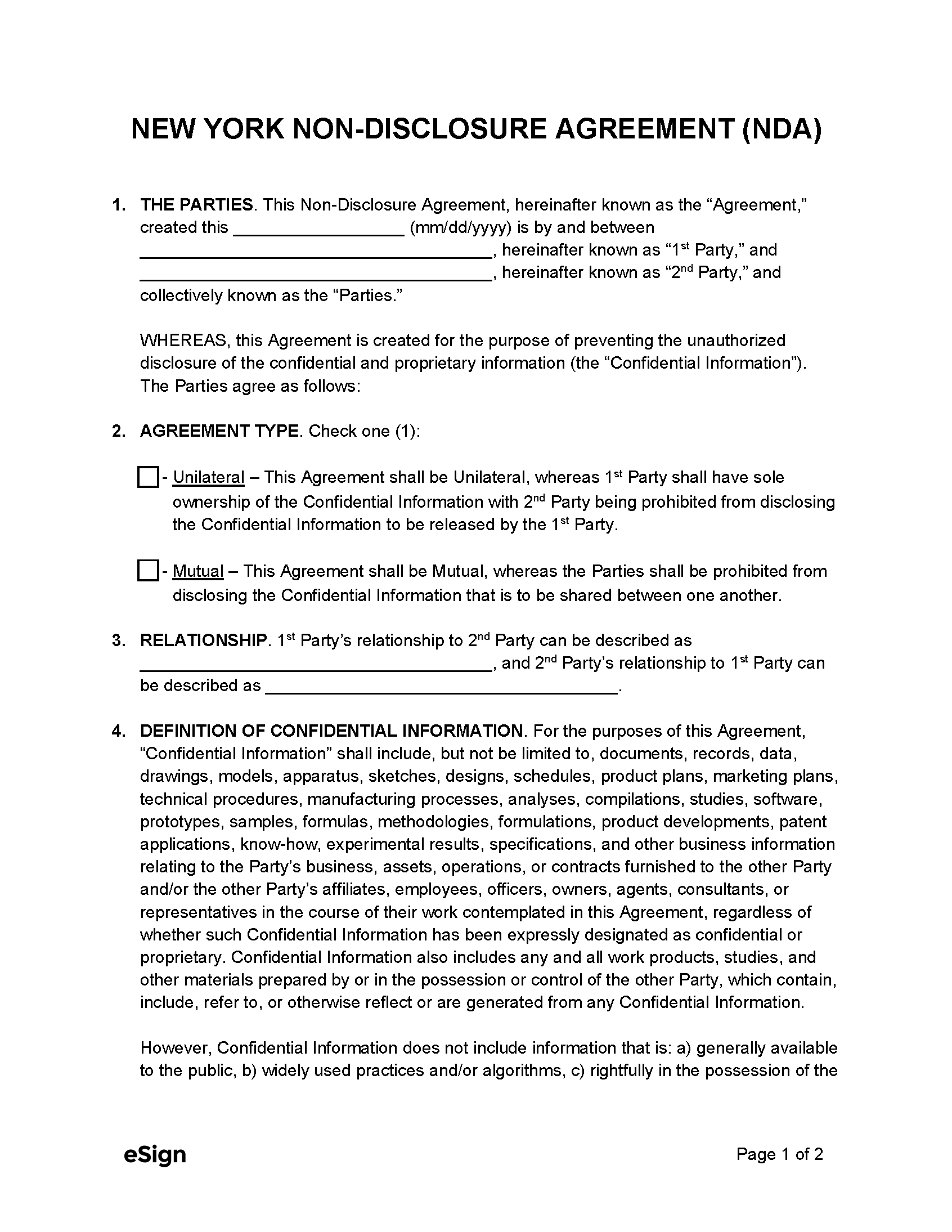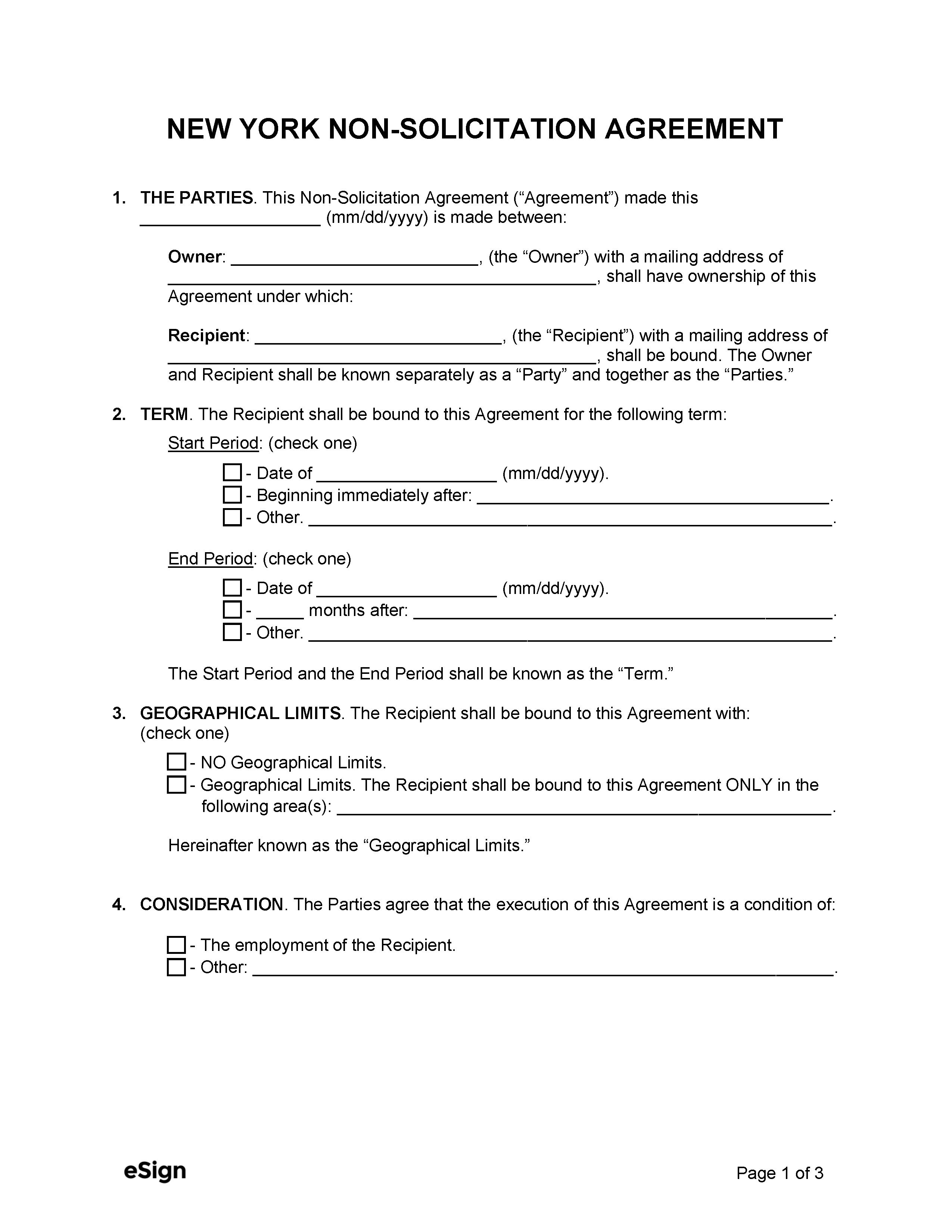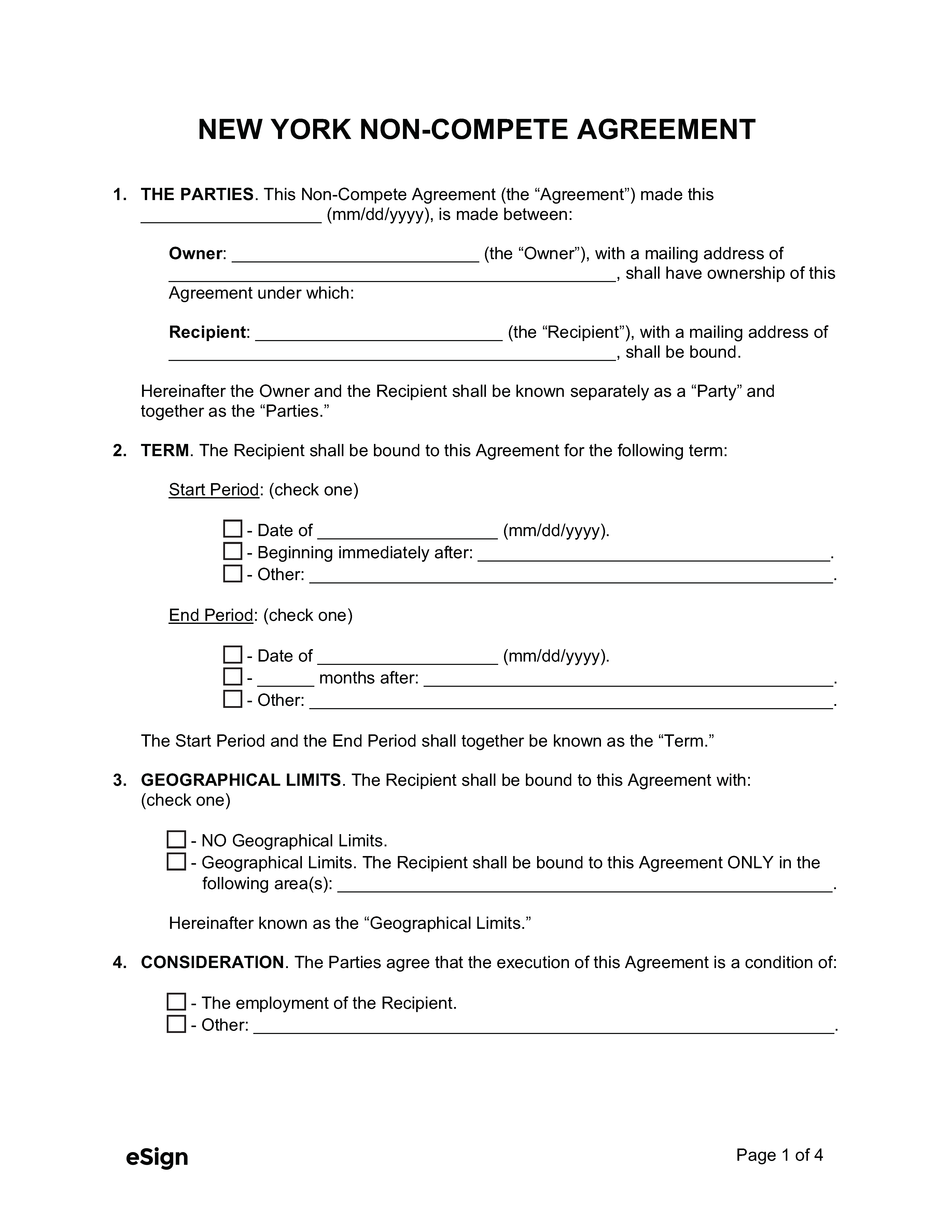The agreement must also list the consideration (benefit) the employee will receive for signing, or it will be deemed unenforceable; this may come in the form of the initial employment itself, financial compensation, or an increase in skill or professional status.
Contents |
Enforceability in New York
Non-compete agreements are enforceable in New York, although they are generally disfavored by state courts for their restraint on trade. For a non-compete to be deemed enforceable, it must meet the following criteria:
- It must be necessary but no greater than required to protect the employer’s legitimate business interests;
- It does not impose excessive hardship on the employee;
- It does not cause the public any harm;[1] and,
- Its geographical and durational scope are equitable.[2]
An exception to the above criteria is the “employee choice doctrine,” which states that when the employee has a choice not to compete and retain post-employment benefits or compete and lose those benefits, the court will enforce the non-compete regardless of reasonableness.[3]
When it IS Enforceable
- Protectable interests. A non-compete agreement may be enforced if the employer has protectable business interests, which may include:
- Sensitive information and trade secrets;
- Customer goodwill (if the customer relationship started during the employee’s term);[1]
- Preventing hard caused by an employee with unique, special, or extraordinary services from working with a competitor;[4] and,
- The employer’s client base and confidential customer information.[5]
When it’s NOT Enforceable
- Lawyers. The New York State Bar Association stipulates that legal professionals may not enter into any agreement that impedes their ability to practice law (except those concerning retirement benefits.[6]
- Financial industry employees. A non-compete is unenforceable if it attempts to prevent a registered representative of the Financial Industry Regulatory Authority (FINRA) from bringing their customers to another firm. However, an agreement that prevents the solicitation of customers could be enforceable.[7]
- Broadcast employees. Broadcasting industry employers are prohibited from requiring any on-air or off-air employee (excluding management) to enter any agreement that would restrict them from working for a specific time, in a particular geographical area, or with a specific employer or industry.[8]
Maximum Time Period
Though New York courts determine the maximum allowable period on a case-by-case basis, restrictions of six (6) months or less have been repeatedly upheld, as exemplified in Ticor Title Ins. Co. v. Cohen,[4] and Natsource LLC v. Paribello.[9]
Longer terms are also upheld under certain circumstances. In one case, the court determined a two (2) year covenant was reasonable because it was limited in time and geographical scope and did not overly burden the former employee nor the public.[10]
Restrictive periods of up to five (5) years have been enforced as well, as was the case when a physician was barred from competing with his former medical partnership.[11]
Geographical Area
No state statute limits the geographical area of a non-compete agreement, and New York courts take the facts of each case to determine the reasonableness of these restrictions.
In one case, a nationwide restriction was deemed unenforceable due to the fact that the employer was only operating in eight (8) states.[12] While a physician was banned from practicing within a 30-mile radius of the village where his partners practiced unless otherwise permitted in writing.[11]
Due to technological advancements and global competition, New York courts have been known to enforce broad geographic restrictions. In one case, a nationwide rule was enforced because the former employee could conduct his business anywhere there was a telephone.[13]
Consideration
A non-compete agreement must be supported by sufficient consideration that benefits the employee. This may come in many forms, including:
- The commencement of employment;[14]
- Continued employment if the employee remained with the employer for a long time after the covenant was signed or if termination was the alternative to signing;[14]
- The employee was provided payments in exchange for singing the restrictive covenants;[15] or,
- If the employee received an augmentation in professional status, skill, or knowledge.[16]
Sources
- BDO Seidman v. Hirshberg, 93 N.Y.2d 382, 690 N.Y.S.2d 854, 712 N.E.2d 1220 (N.Y. 1999)
- Reed, Roberts v. Strauman, 40 N.Y.2d 303, 307, 386 N.Y.S.2d 677, 353 N.E.2d 590 (N.Y. 1976)
- Morris v. Schroder Cap. Mgmt. Int’l, 7 N.Y.3d 616, 620-22, 859 N.E.2d 503, 506-07 (2006)
- Ticor Title Ins. Co. v. Cohen, 173 F.3d 63, 70 (2d Cir. 1999)
- Silipos, Inc. v. Bickel, No. 1:06-CV-02205, 2006 WL 2265055 (S.D.N.Y. Aug. 8, 2006), No. 05 Civ. 4356 (RCC) (S.D.N.Y. Aug. 8, 2006)
- NY ST RPC Rule 5.6
- FINRA Rules 2140 and 11870
- N.Y. Lab. Law § 202-k
- Natsource LLC v. Paribello, 151 F. Supp. 2d 465 (S.D.N.Y. 2001)
- John Hancock Mut. Life Ins. Co. v. Austin, 916 F. Supp 158 (N.D.N.Y. 1996)
- Gelder Med. Group v. Webber, 41 N.Y.2d 680, 394 N.Y.S.2d 867, 363 N.E.2d 573 (N.Y. 1977)
- Good v. Kosachuk, 49 A.D.3d 331, 332, 2008 N.Y. Slip Op. 2031, 853 N.Y.S.2d 75, 77 (N.Y. App. Div. 2008)
- GFI BROKERS, LLC v. SANTANA, 06 Civ. 3988 (GEL), 06 Civ. 4611 (GEL) (S.D.N.Y. Aug. 6, 2008)
- Zellner v. Stephen D. Conrad, M.D., P.C., 183 A.D.2d 250, 257, 589 N.Y.S.2d 903, 907 (1992)
- Lenel Sys. Int’l, Inc. v. Smith, 106 A.D.3d 1536, 966 N.Y.S.2d 618, 621, 2013 N.Y. Slip Op. 3259 (N.Y. App. Div. 2013)
- Young Co. v. Galasso, 142 Misc. 2d 738, 741, 538 N.Y.S.2d 424, 427 (N.Y. Sup. Ct. 1989)
- Scott, Stackrow & Co., C.P.A.’s, P.C. v. Skavina, 9 A.D.3d 805, 806-08, 780 N.Y.S.2d 675, 677-78 (2004)
Related Forms (2)

Download: PDF, Word (.docx), OpenDocument

Download: PDF, Word (.docx), OpenDocument
